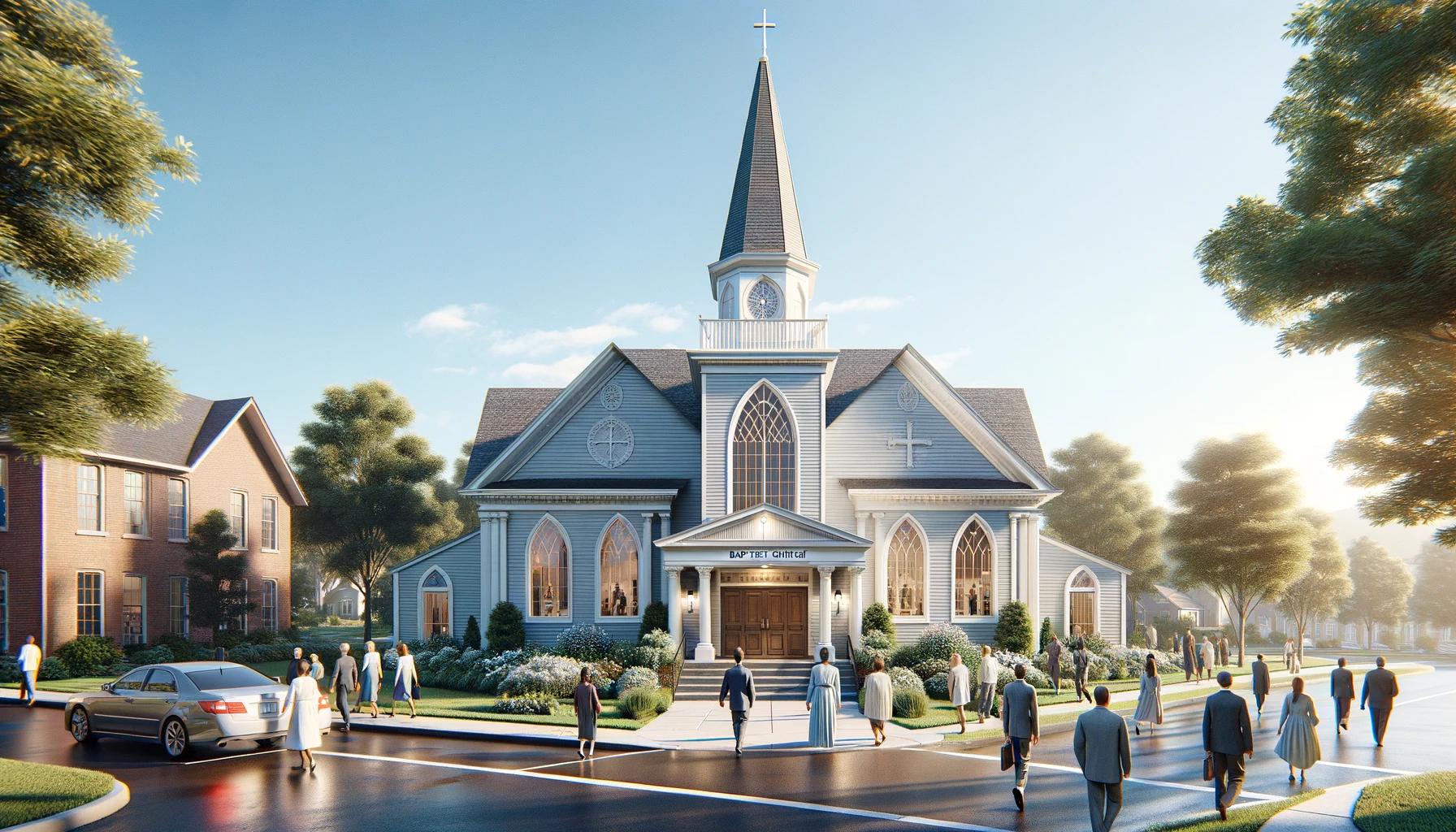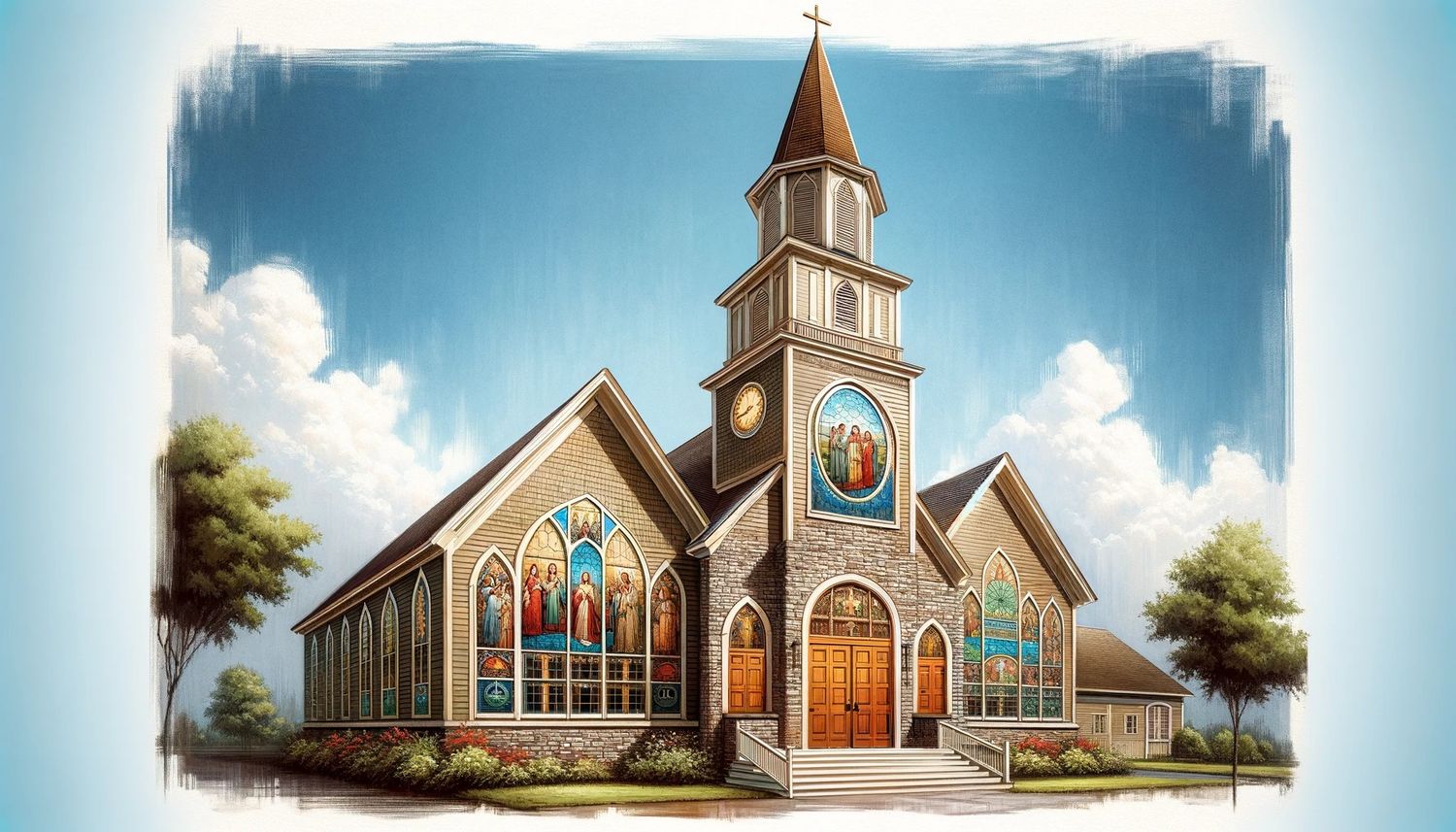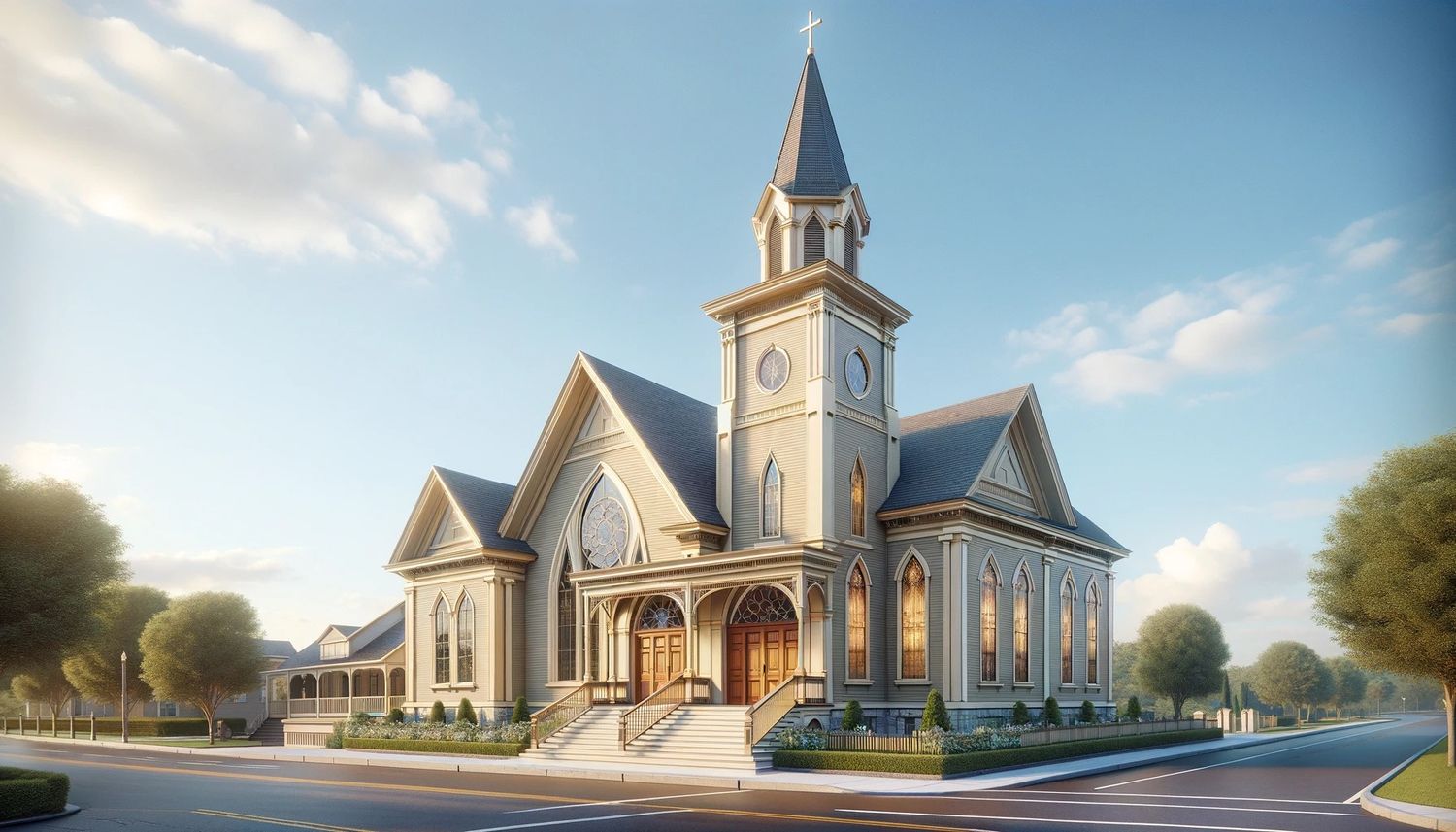Home>Theology and Spirituality>What Are Baptist Churches


Theology and Spirituality
What Are Baptist Churches
Published: February 20, 2024
Ericka Andersen, an editor at Christian.net, expertly merges digital strategy with content creation, focusing on faith and societal issues. Her communication skills enhance the platform's engaging narratives, fostering meaningful dialogue on belief's impact on society.
Discover the theology and spirituality of Baptist churches. Learn about their beliefs, practices, and impact on the Christian faith. Explore the rich history and traditions of Baptist theology and spirituality.
(Many of the links in this article redirect to a specific reviewed product. Your purchase of these products through affiliate links helps to generate commission for Christian.net, at no extra cost. Learn more)
Table of Contents
Introduction
Baptist churches are a significant and influential denomination within Christianity, known for their emphasis on individual faith and the autonomy of local congregations. With a rich history and a distinct set of beliefs and practices, Baptist churches have made a profound impact on religious life and community engagement. Understanding the origins, core tenets, and organizational structure of Baptist churches provides valuable insight into their role in shaping the spiritual landscape.
The history of Baptist churches is marked by a commitment to religious freedom, believer's baptism, and the authority of Scripture. This denomination has evolved through centuries of theological development and cultural adaptation, leaving a lasting imprint on Christianity as a whole. Exploring the beliefs and practices of Baptist churches reveals their dedication to personal faith, congregational governance, and the proclamation of the Gospel.
Furthermore, the structure of Baptist churches reflects their commitment to local autonomy and congregational decision-making. This decentralized approach distinguishes Baptist churches from other denominations and underscores their belief in the priesthood of all believers. By delving into the worship and community life of Baptist congregations, one gains a deeper understanding of their spiritual practices, fellowship dynamics, and outreach initiatives.
The influence and impact of Baptist churches extend beyond their theological distinctives, encompassing social activism, missions work, and educational endeavors. Through their commitment to religious liberty and social justice, Baptist communities have played a pivotal role in advocating for human rights and addressing societal challenges.
As we explore the multifaceted nature of Baptist churches, it becomes evident that their legacy is intertwined with the broader narrative of Christianity. By examining their historical roots, doctrinal framework, and communal engagement, we gain valuable insights into the enduring significance of Baptist churches in the religious tapestry of the world.
Read more: What Is A Berean Baptist Church
History of Baptist Churches
The history of Baptist churches is a compelling narrative that traces its roots to the early days of the Protestant Reformation. The emergence of Baptist principles can be linked to the 17th century, a time marked by fervent religious upheaval and the quest for spiritual autonomy. The foundational tenets of Baptist theology, including believer's baptism and the autonomy of local congregations, reflect a profound commitment to individual faith and congregational governance.
The origins of the Baptist movement can be attributed to dissenting voices within the English Separatist and Puritan communities. Influential figures such as John Smyth and Thomas Helwys played pivotal roles in advocating for religious liberty and the believer's baptism, which became defining features of Baptist identity. The year 1609 is often cited as a significant milestone, as it marks the establishment of the first Baptist congregation in Amsterdam by John Smyth.
The early Baptists faced persecution and marginalization due to their rejection of infant baptism and their insistence on voluntary, adult baptism based on personal faith. Despite these challenges, the Baptist movement continued to gain momentum, spreading to various regions and attracting individuals who sought a more personal and participatory expression of their faith.
The 17th and 18th centuries witnessed the growth of Baptist communities in England and America, with notable leaders such as Roger Williams and Isaac Backus advocating for religious freedom and the separation of church and state. Baptists actively participated in the shaping of religious liberty and the advancement of democratic principles, leaving an indelible mark on the social and political landscape.
The 19th and 20th centuries brought further diversification and expansion of Baptist churches, leading to the formation of various Baptist conventions and associations. This period also saw the emergence of distinct theological perspectives within the Baptist tradition, ranging from conservative to progressive interpretations of Scripture and doctrine.
Today, Baptist churches encompass a wide spectrum of theological orientations, cultural expressions, and global outreach. The historical journey of Baptist churches reflects a steadfast commitment to foundational principles while adapting to the evolving dynamics of society and culture. This enduring legacy continues to shape the identity and mission of Baptist congregations around the world, affirming their place in the tapestry of Christian history.
Beliefs and Practices
Baptist churches are distinguished by their core beliefs and practices, which underscore their theological convictions and communal expressions of faith. Central to Baptist theology is the principle of soul competency, affirming the individual's autonomy in matters of faith and conscience. This foundational belief emphasizes the direct relationship between the believer and God, highlighting the personal responsibility for spiritual discernment and decision-making.
Believer's baptism holds a prominent position in Baptist theology, signifying the voluntary profession of faith and the symbolic act of immersion in water. This practice reflects the conviction that baptism is reserved for those who have consciously embraced the Christian faith, marking a significant departure from infant baptism prevalent in other Christian traditions.
The authority of Scripture serves as a guiding principle for Baptist churches, emphasizing the primacy of the Bible as the ultimate source of divine revelation and spiritual truth. This commitment to scriptural authority informs preaching, teaching, and doctrinal formulation within Baptist congregations, shaping their theological outlook and ethical perspectives.
Congregational governance is a hallmark of Baptist polity, reflecting the belief in the autonomy of local churches and the priesthood of all believers. Each congregation is self-governing, with decisions made collectively by members and leaders, fostering a participatory approach to church leadership and decision-making processes.
Worship practices in Baptist churches often encompass a blend of traditional hymns, contemporary music, prayer, and expository preaching, reflecting a diversity of worship styles across different congregations. The celebration of the Lord's Supper, also known as communion, holds significance as a symbolic remembrance of Christ's sacrifice and a communal expression of faith.
Baptist churches are known for their commitment to evangelism and missions, seeking to share the message of salvation and engage in compassionate outreach to local and global communities. This emphasis on spreading the Gospel and addressing social needs aligns with the Baptist tradition's focus on holistic ministry and the integration of faith and action.
The beliefs and practices of Baptist churches reflect a dynamic interplay of theological convictions, communal worship, and missional engagement, shaping the identity and mission of Baptist congregations worldwide. This distinctive framework underscores the enduring legacy of Baptist theology and its impact on the spiritual lives of individuals and communities.
Baptist Church Structure
The organizational structure of Baptist churches is characterized by a commitment to local autonomy and congregational governance. Unlike hierarchical denominations with centralized authority, Baptist congregations operate independently, making decisions regarding their beliefs, practices, and community engagement. This decentralized approach reflects the Baptist belief in the priesthood of all believers and the freedom of individual congregations to discern God's leading in their unique contexts.
At the local level, Baptist churches are typically led by a team of ordained ministers, deacons, and lay leaders who collaborate in shepherding the congregation and overseeing various aspects of church life. While the specific titles and roles may vary, the emphasis on shared leadership and mutual accountability is a defining feature of Baptist church structure.
Baptist churches often gather for congregational meetings where members have the opportunity to participate in decision-making processes, including the election of leaders, approval of budgets, and affirmation of major initiatives. This participatory approach fosters a sense of ownership and investment among the congregation, reinforcing the communal nature of Baptist church governance.
In addition to local autonomy, Baptist churches may choose to associate with regional or national bodies, such as associations, conventions, or fellowships, for mutual support, cooperative missions, and shared resources. These voluntary associations allow churches to collaborate on broader initiatives while preserving their independence in matters of faith and practice.
The absence of a formal hierarchy does not imply isolation or lack of accountability. Baptist churches often engage in peer relationships and mutual accountability with sister congregations, seeking counsel and support from like-minded churches while upholding their distinctive convictions and practices.
The flexibility and adaptability of Baptist church structure enable congregations to respond to the evolving needs of their communities and the dynamic nature of ministry. This organic approach to governance aligns with the Baptist commitment to the priesthood of all believers and the recognition of the Holy Spirit's guidance in the life of the church.
The structure of Baptist churches reflects a balance between local autonomy and collaborative partnership, embodying the principles of shared leadership, congregational participation, and interdependence within the broader Baptist community. This distinctive framework underscores the dynamic and responsive nature of Baptist church governance, shaping the identity and mission of congregations as they engage in ministry and outreach.
Worship and Community Life
Worship lies at the heart of Baptist church life, serving as a vibrant expression of faith, fellowship, and spiritual devotion. Baptist congregations embrace a diverse array of worship styles, reflecting the cultural, generational, and theological dynamics within their communities. From traditional hymns that resonate with historical roots to contemporary music that engages modern sensibilities, Baptist worship services embody a rich tapestry of musical expressions and heartfelt praise.
The act of congregational singing holds a special place in Baptist worship, fostering a sense of unity and collective adoration. Hymns and worship songs, accompanied by instrumental music, create an atmosphere of reverence and joy, inviting participants to engage in corporate worship that transcends individual experiences. The emphasis on congregational participation underscores the communal nature of Baptist worship, where every voice contributes to the symphony of praise and thanksgiving.
Prayer serves as a foundational element of Baptist worship, providing moments of reflection, intercession, and spiritual communion. Through spoken prayers, silent contemplation, and responsive readings, congregants are invited to connect with God on a personal and communal level, seeking His guidance, comfort, and transformative presence. The practice of prayer cultivates a spirit of dependence on God and a deepening of relational bonds within the faith community.
Expository preaching, rooted in the authoritative exposition of Scripture, occupies a central role in Baptist worship services. Pastors and preachers deliver sermons that expound on biblical truths, offer practical insights for Christian living, and challenge congregants to apply God's Word to their daily lives. The proclamation of the Gospel through preaching serves to edify, instruct, and inspire the church body, nurturing spiritual growth and theological understanding.
The celebration of the Lord's Supper, or communion, holds profound significance in Baptist worship, symbolizing the unity of believers, the remembrance of Christ's sacrifice, and the anticipation of His return. This sacramental observance fosters a sense of spiritual intimacy and communal participation, reinforcing the bonds of fellowship and the shared identity of the body of Christ.
Community life within Baptist churches extends beyond the confines of formal worship services, encompassing fellowship gatherings, small group interactions, and collaborative ministry endeavors. These relational connections provide avenues for mutual support, discipleship, and shared mission, fostering a sense of belonging and accountability within the faith community.
The integration of worship and community life in Baptist churches reflects a holistic approach to spiritual formation, emphasizing the interconnectedness of personal devotion, congregational engagement, and missional outreach. This dynamic interplay of worship and community life shapes the identity and ethos of Baptist congregations, nurturing a vibrant faith culture that resonates with the diverse needs and aspirations of its members.
Read more: What Is Landover Baptist Church
Baptist Church Influence and Impact
The influence and impact of Baptist churches extend far beyond the confines of their congregational gatherings, permeating the social, cultural, and spiritual fabric of communities around the world. Rooted in a rich legacy of advocacy for religious freedom, social justice, and missions work, Baptist churches have left an indelible mark on the global landscape, shaping the course of history and championing causes that resonate with the core tenets of their faith.
One of the defining contributions of Baptist churches lies in their unwavering commitment to religious liberty and the separation of church and state. Throughout history, Baptist leaders and congregations have been at the forefront of movements advocating for the freedom of conscience, the right to worship without coercion, and the principle of non-establishment of religion. Their steadfast stance on religious freedom has influenced legal frameworks, constitutional provisions, and societal attitudes toward the protection of diverse religious expressions.
Furthermore, Baptist churches have been instrumental in championing social justice causes, addressing issues such as racial equality, human rights, and poverty alleviation. From the civil rights movement in the United States to global initiatives combating systemic injustices, Baptist communities have mobilized their resources and voices to confront societal inequities and promote the dignity and worth of every individual.
The global impact of Baptist churches is exemplified through their extensive missions work, encompassing evangelism, humanitarian aid, and community development initiatives. Baptist missionaries have ventured into remote regions, urban centers, and cross-cultural contexts, sharing the message of hope and engaging in holistic ministry that addresses spiritual, physical, and emotional needs. The enduring legacy of Baptist missions reflects a commitment to global engagement and the transformative power of compassionate outreach.
Moreover, Baptist churches have played a pivotal role in educational endeavors, establishing schools, colleges, and seminaries that prioritize academic excellence, character formation, and the integration of faith and learning. These educational institutions have equipped generations of students with the knowledge, skills, and ethical foundations to contribute meaningfully to society and engage in vocations that reflect their Christian convictions.
The influence and impact of Baptist churches resonate across diverse spheres, encompassing the realms of politics, education, social activism, and humanitarian efforts. Their enduring legacy serves as a testament to the enduring relevance of their theological principles and the transformative potential of faith-based initiatives in addressing the complex challenges of the modern world.
Conclusion
In conclusion, the multifaceted tapestry of Baptist churches encompasses a rich historical legacy, distinctive beliefs and practices, unique organizational structure, vibrant worship and community life, and a far-reaching influence on society and culture. The journey of Baptist churches from their early dissenting roots to their global presence today reflects a steadfast commitment to individual faith, congregational autonomy, and the transformative power of the Gospel message.
The historical narrative of Baptist churches is a testament to their resilience in the face of persecution and their unwavering dedication to principles of religious freedom and believer's baptism. From the early dissenters of the 17th century to the diverse expressions of Baptist identity in the contemporary world, the journey of Baptist churches underscores their adaptability and enduring relevance in the ever-changing landscape of Christianity.
The core beliefs and practices of Baptist churches, including soul competency, believer's baptism, and the authority of Scripture, form the theological bedrock that shapes their communal life and mission. The emphasis on congregational governance, participatory worship, and missional engagement reflects a commitment to holistic ministry and the integration of faith with everyday life.
The organizational structure of Baptist churches, characterized by local autonomy and collaborative partnerships, embodies a dynamic balance between independence and interdependence. This flexible framework allows congregations to respond to the evolving needs of their communities while fostering a sense of shared identity and purpose within the broader Baptist family.
Worship and community life within Baptist churches create a nurturing environment for spiritual growth, relational connections, and collective expressions of faith. The diversity of worship styles, the centrality of prayer and preaching, and the bonds of fellowship contribute to a vibrant faith culture that resonates with the diverse needs and aspirations of its members.
The influence and impact of Baptist churches extend beyond their congregational boundaries, encompassing advocacy for religious liberty, social justice causes, global missions work, and educational initiatives. The enduring legacy of Baptist churches serves as a testament to their enduring relevance and transformative potential in addressing the complex challenges of the modern world.
In essence, the story of Baptist churches is a narrative of resilience, conviction, and compassionate engagement. Their historical journey, theological distinctives, communal dynamics, and societal contributions collectively affirm their enduring significance in the religious tapestry of the world. As Baptist churches continue to navigate the currents of change and opportunity, their legacy remains rooted in a steadfast commitment to the timeless truths of the Christian faith and the transformative power of God's love.














